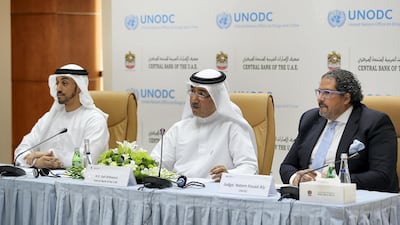The UAE is rolling out a new anti-money laundering software system this week, becoming the first GCC country to use the platform developed by the United Nations Office on Drugs and Crime.
“We are demonstrating that our financial institutions will always prioritise safety and compliance above all and we will not compromise for the protection of our financial institutions, nation and people,” Saif Al Shamsi, deputy governor of the UAE Central Bank, said at a press conference Sunday.
All entities under the central bank’s banking supervision department, the Insurance Authority, the Securities and Commodities Authority, Abu Dhabi Global Markets and the Dubai Financial Services Authority are included and must be registered with the new system by June 27.
The goAML system, which is used by 50 financial intelligence units around the world, is part of the UAE’s new regulations against money laundering and terrorist financing that came into effect last year.
In line with decree federal law no. 20 of 2018 on “Anti-Money Laundering and Combating Financing of Terrorism and Illegal Organisations”, the central bank established an independent financial intelligence unit (FIU) tasked with receiving and investigating all reports of suspected illicit activity submitted by financial institutions and other corporate establishments. The decree also outlined stricter penalties for violations, including fines between Dh50,000 and Dh5 million.
“We aim to ensure an overall safer community by preventing money-laundering, the financing of terrorism, and any suspicious financial activity — and goAML will help us achieve that,” said Ali Baalawi, the acting head of the central bank’s financial intelligence unit.
The new reporting platform, which will replace the current system Thursday, will help the FIU gather and analyse information, and share that information with law enforcement authorities when deemed necessary. It will make it easier to connect intelligence databases, observe trends when analysing suspicious transaction reports (STRs) and increase proactiveness, Mr Baalawi said.
To prepare for migration to the new system, seven institutions participated in a pilot project and many have undergone training, such as exchange houses at a Foreign Exchange and Remittance Group meeting in March.
It is mandatory to register in the new system and “if [institutions] don’t report STRs, they are subject to penalties,” said Mr Al Shamsi.
Approximately half of the 900 financial institutions and “designated non-financial businesses and professions” required to register have done so since registration opened May 1. The other half must register by June 27.
Last year, the central bank received 7,404 STRs and 1,516 reports on suspected fraud, an increase of 18.2 per cent from 2017, according to the bank’s 2018 annual report. Around 80 per cent of all STRs were filed by banks.


